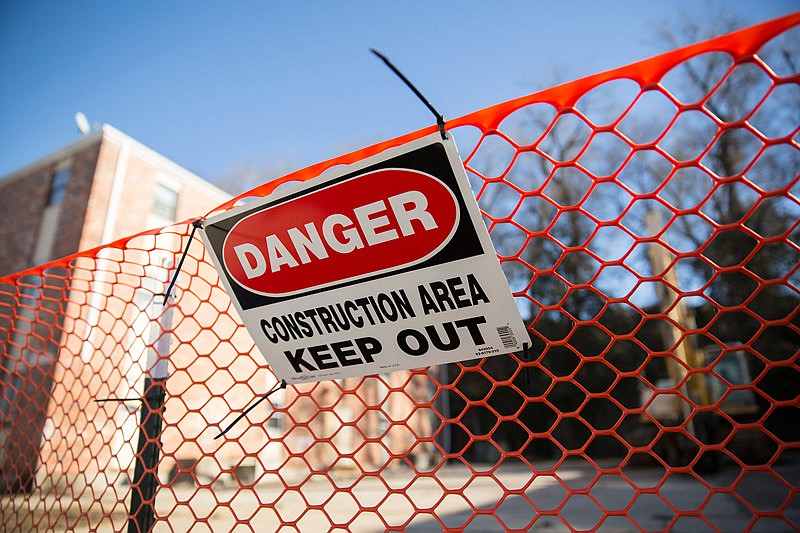A tiered approach for the demolition ordinance was introduced to the city's Public Works and Planning Committee during Thursday's meeting, but city staff has more research to do before it goes back to the Jefferson City Council.
The ordinance, which was sent back to the Public Works and Planning Committee after a City Council work session last month, was created to make it harder to demolish historic structures in the city.
City staff recommended creating a new draft ordinance based on a three-tiered approach but warned they wanted to do more research before presenting the draft to the full council.
The review process would be similar to the current process for structures 50-99 years old. In the current process, a property owner can submit an application to the city's Historic Preservation Commission. The commission makes a recommendation of whether to approve or deny the demolition permit. The commission's advice does not allow demolition proposals to be denied but can involve waiting periods so other options can be explored.
For structures 100 years old or older, a process would be created so the Historic Preservation Commission has the chance to recommend denying a demolition permit. If a denial is recommended, the applicant can appeal to the City Council to reverse the commission's decision.
Structures 50 years old or older in locally designated historic districts would go through the same process as structures 100 years old or older presented in the second tier. The commission would not use the National Registered Listings, National Registered Historic Districts or locally designated Landmark properties as reasons for denying a demolition permit. They can be used as supporting documentation when establishing local historic districts, though.
Several council members said they liked the idea of structuring the new ordinance based on these concepts but posed several questions they thought should be addressed in the draft. One highly discussed topic was making Old Town - an established area that has received federal funding - a local historic district.
Ward 3 Councilman Ken Hussey said after the May work session he thought almost everyone left with a consensus of establishing Old Town's boundaries as a historic district. The boundaries for Old Town was developed in 2007 for city incentive programs to help rejuvenate the area, but city Neighborhood Services Coordinator Jayme Abbott said the area was not originally established for historic preservation or demolition.
Abbott said the drafted ordinance was sent to State Historic Preservation Office to make sure the city was not jeopardizing its certified local government status - a designation through the Department of Natural Resources' State Historic Preservation Office that allows the city to apply for historic preservation grant funds. The day of the council work session, she received a reply expressing concerns about due process for properties already listed on the National Register.
"When a property is listed on the register, it's a designation. It is told to the property owners that there is no ties; and it's just an honorary designation, and it recognizes the importance of the property. There is no strings attached," Abbott said. "As our demolition ordinance read, it said any properties listed on the register cannot be demolished."
City Counselor Ryan Moehlman said if the City Council wanted to make Old Town a local historic district, property owners need to know there might be limitations, such as the possibility of being denied a demolition permit, because the property would be in a historic district. To become a local historic district, 75 percent of property owners have to agree it should be deemed such, which Abbott said is a "high bar to meet." However, city staff are considering discussing possible changes to the designation process with the Historic Preservation Commission.
While some expressed urgency to complete the demolition ordinance, Ward 5 Councilman and Committee Chairman Larry Henry said he would rather the city staff take their time.
"I'd rather us get it right this time," he said.
The ordinance was first introduced to the Historic Preservation Commission in September 2015 by the Historic City of Jefferson, a local nonprofit group. The commission approved its version of the ordinance in February after working on it for 18 months.
In April, the city's Planning and Protective Services Department heard comments from the public about the proposed ordinance - 34 in favor and 12 against.
Several local real estate agents expressed concerns about the previously proposed ordinance because of the uncertainty of whether properties are in locally designated historic districts. Abbott said staff were discussing ways to address these concerns in the new ordinance draft, such as putting up signs that state if an area is a historic district.
Abbott and Sonny Sanders, director of the department of planning and protective services, said they do not know when the ordinance will be presented to the council - a motion was made the new ordinance draft go to the full council instead of the Public Works and Planning Committee - but they will give the committee monthly updates on progress.
When the ordinance is close to being finished, Sanders said, the city will hear the public's comments on the new ordinance draft.

